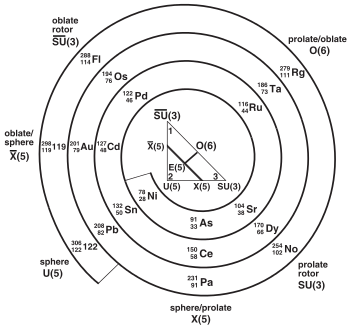Interacting boson model
| Nuclear physics |
|---|
 |
| Nucleus · Nucleons (p, n) · Nuclear matter · Nuclear force · Nuclear structure · Nuclear reaction |
|
Nuclear stability |
|
High energy processes |
|
Nuclear fusion Processes: Stellar · Big Bang · Supernova Nuclides: Primordial · Cosmogenic · Artificial |
|
Scientists Alvarez · Becquerel · Bethe · A.Bohr · N.Bohr · Chadwick · Cockcroft · Ir.Curie · Fr.Curie · Pi.Curie · Skłodowska-Curie · Davisson · Fermi · Hahn · Jensen · Lawrence · Mayer · Meitner · Oliphant · Oppenheimer · Proca · Purcell · Rabi · Rutherford · Soddy · Strassmann · Szilárd · Teller · Thomson · Walton · Wigner |
The interacting boson model (IBM) is a model in nuclear physics in which nucleons (protons or neutrons) pair up, essentially acting as a single particle with boson properties, with integral spin of 0, 2 or 4.
It is sometimes known as the Interacting boson approximation (IBA).[1]:7
The IBM1/IBM-I model treats both types of nucleons the same and considers only pairs of nucleons coupled to total angular momentum 0 and 2, called respectively, s and d bosons.
The IBM2/IBM-II model treats protons and neutrons separately.
Both models are restricted to nuclei with even numbers of protons and neutrons.[1]:9

The model can be used to predict vibrational and rotational modes of non-spherical nuclei.[2]
History
This model was invented by Akito Arima and Francesco Iachello in 1974.[1]:6
See also
References
- Arima, Iachello Collective nuclear states as representations of a SU(6) Group, Physical Review Letters 35, 1069–1072 (1975).
- Arima, Iachello The interacting boson model, Cambridge University Press, 1987.
- Arima, Iachello Interacting boson model of collective states, Part 1 (the vibrational limit) Annals of Physics 99, 253-317 (1976), Part 2 (the rotational limit) ibid. 111, 201-238 (1978), Part 3 (the transition from SU (5) to SU (3)), ibid. 115, 325-366 (1978), Part 4 (the O(6) limit) ibid. 123, 468-492 (1979).
- Arima, Iachello The Interacting Boson Model, Annual Review of Nuclear and Particle Science 31, 75 (1981).
- Talmi Simple Models of Complex Nuclei: The Shell Model and the Interacting Boson Model (1993) Harwood Academic Publishers
- 1 2 3 Walter Pfeifer (1998). An Introduction to the Interacting Boson Model of the Atomic Nucleus (PDF). ISBN 3-7281-2520-2.
- 1 2 Kratz, J. V. (5 September 2011). The Impact of Superheavy Elements on the Chemical and Physical Sciences (PDF). 4th International Conference on the Chemistry and Physics of the Transactinide Elements. Retrieved 27 August 2013.